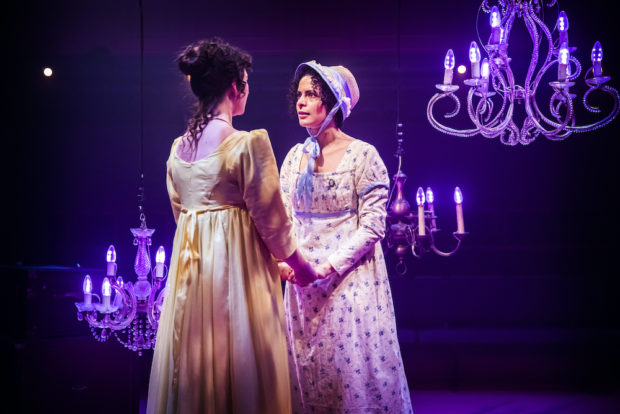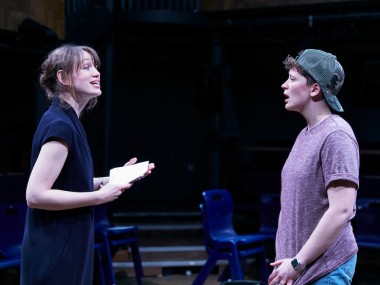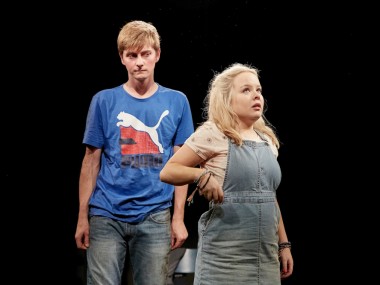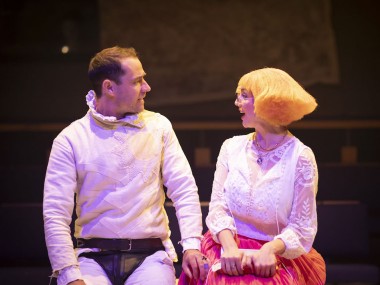Northanger Abbey, Orange Tree Theatre
Wednesday 24th January 2024

Jane Austen is not just a classic novelist — she’s a cultural institution and a national treasure. Since the 1990s there has been an avalanche not only of straight adaptations of her novels in all media, but an increasingly strong presence in the wider culture, from postage stamps to fan tours to memorabilia. In theatre, adaptations of her work have become increasing adventurous, from Laura Wade’s postmodern The Watsons to the entirely improvised Austentatious. Now Zoe Cooper arrives at the Orange Tree Theatre, which staged her wonderful 2019 play Out of Water, with her own queer take on Northanger Abbey, a co-production with three regional theatres.
First, you need to take your paperback copy of the 1818 Austen novel down from your shelf, rub the dust off and remind yourself of the plot. It’s a coming-of-age story about 17-year-old Catherine Morland, from a humble family (with a surname suggesting an uncultivated character), who is taken by the wealthier Allen family on a visit to Bath. There she attends balls and meets Isabella, whose boorish brother John pays attention to her, as well as Henry, who falls in love with her. Isabella turns out to be a bad friend, but Henry invites Catherine to his home, Northanger Abbey, where she meets his sister and his father.
Being partly a satire on gothic novels, as well as an appreciation of the power of fiction, Austen’s novel involves Catherine’s fantasies about Henry’s father being a villain who has done away with his wife in a gloomy abbey whose rooms have chests full of secret manuscripts and terrifying storm-filled nights. If Catherine eventually gets her man, she first has to confront the problem of her overheated imagination and of her own family’s comparative poverty. At the climax of the novel she is asked to leave Northanger Abbey by Henry’s father not because she foolishly suspected him of murder, but because he originally thought that she was much richer than she actually is.
Cooper’s exuberant adaptation takes the novel and gives it an unmistakably contemporary flavour. The central characters are now called Cath, Iz and Hen, and the story begins with a feminist reminder of all of the things that are absent from Austen’s original: the pain of childbirth as Cath is born; her first period; and her fraught relationships with her brothers. Using just three actors, who play some dozen characters, Cooper’s text is postmodern in its overt theatricality: from the start the actors offer explanations of the plot direct to the audience, comment on how their own re-enactment of the story is progressing, and switch between dialogue and narrative, between sincere naturalism and physical theatre — and between showing and telling.
This version of Northanger Abbey has a joyful energy and adventurous quality which Cooper absolutely revels in, clearly enjoying and milking the comedy of putting a well-known classic in front of an audience that will respond to its contemporary relevance. (Purists stay at home!) As the teenage Cath tries to find her place in the world, well away from the comforts and restrictions of home, she discovers not only the attractions of heterosexuality, but also the pull of same-sex relationships. Cooper’s Iz is here a gay character who lives a double life, on the one hand pursuing a wealthy husband, on the other hand trying to develop deep female friendships.
In addition, if you can pardon some of the unfortunate comments about Austen’s place in the canon of Eng Lit in Cooper’s Writer’s Note in the playtext, her sense of Cath as an avid reader goes beyond gothic satire to explore the way that fiction can be emotionally absorbing — as well as life changing — and can provoke the desire to write. Her version ends with the woman reader becoming a woman writer, which historically is as much of a hidden history as the presence of queer feelings has always been subversive. In the meantime, while the play’s queerness smashes the binary definitions of gender, the whole evening comes across as a vigorously fun time.
Cooper’s meta-theatrical spirit is clearly manifest in her Cath being simultaneously a version of Austen and of the playwright herself, and the play neatly dethrones the novel’s Henry, who continues to mansplain as Hen but also finds his interest in women’s fashion get an emphasis which suggests a much more fluid gender identity than that of, for example, the loudmouthed John. So while Cath has to learn to cope with the advances of intrusive toffs and dangerous soldiers, she also has to find a way of loving that is her very own. Her relative poverty is a social fact that keeps popping up in this comedy of manners.
Because most of the audience expect some gothic thrills from a staging of Northanger Abbey, Cooper is careful to include a candle-lit scene in which Cath confronts her own wild imaginings before Hen puts her right. But much of the rest of the adaptation is a knowingly satirical take on social conventions, our own as well as those of Austen’s time, with some highly enjoyable episodes: there are balls (innuendo intended), country dancing, a carriage ride and a carriage crash, as well as tense breakfasts and some gloriously silly moments. Yet although the comedy sparkles it never quite obscures the emotional depth of the story.
Tessa Walker’s excellent production, on designer Hannah Sibai’s set (floating chandeliers, a chaise longue, a long table and musty wooden chests a plenty), features three super performances from Rebecca Banatvala as the humble but feisty Cath, as well as a narrator and writer; AK Golding as both the worldly Iz and some ugly men; and Sam Newton as the polite if sometimes conversationally challenged Hen, the brutal John and Cath’s extremely competent mother. All three also play the story’s other aunts and uncles, Henry’s depressed father and so on. The result is a brilliantly conceived and immaculately executed piece of queer and postmodern theatre. And a real joy to watch.
This review first appeared on The Theatre Times




